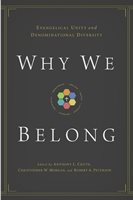A Brief Book Notice from Books At a Glance
If you don’t expect a book about inter-denominational unity and denominational distinctives and history to hold your interest, then I suggest you pick up a copy of Why We Belong: Evangelical Unity and Denominational Diversity and see if within minutes you have not already found it thoroughly enjoyable. From its exposition of Ephesians concerning God’s purpose to establish cosmic unity in Christ through the history of various denominations to the individual accounts of personal denominational appreciation and, finally, the challenge of maintaining unity within truth while allowing for measures of differences on certain matters, this book is simply an enjoyable read. You may find yourself frustrated a bit, here and there, while representatives of denominations other than your own make their case. And you may even find yourself frustrated that your own denomination was not defined with sufficient vigor – or exclusion! But you will at least go away with a clearer understanding of denominational distinctives and a deeper appreciation of central theological issues that matter most.
Discussion
It would be difficult to argue that the doctrines that divide (would segregate be a better word here?) Christians are unimportant or that they should be ignored. Doctrines that bear on the great commission and its attending ordinance / sacrament, doctrines that define what or who the church is, and such, all demand definition. And so given the disagreements over these, at least some kind of denominationalism becomes necessary. And yet if there truly is a common salvation in a common gospel, then it is also necessary to acknowledge a fundamental unity that is shared and to insist that although we may be “denominated” variously, we who are in Christ belong to his church together.
There is so much about human fallenness and frailty that makes it very difficult to hold both sides of this equation at the same time. Is it even possible for us to be both confident and humble? God have mercy on us poor sinners.
But obedience to the word of Christ cannot be selective, and so a book like this can be helpful in sharpening our understanding (and appreciation, perhaps? Sometimes?) of the distinctions that denominate us as Christians of various persuasions and in focusing our faith in those truths apart from which no unity can exist at all.
It is this kind of thinking that explains Why We Belong: Evangelical Unity and Denominational Diversity. A collaborative effort, editors Anthony L. Chute, Christopher W. Morgan, and Robert A. Peterson have brought together a selection of representatives to “make the case” for their respective denominations – Anglican, Baptist, Lutheran, Methodist, Pentecostal, and Presbyterian. Of course there are Baptists, and then there are Baptists. There are Lutherans, and there are Lutherans. And the same goes for all the other labels. But the editors of Why We Belong have not pursued a mere, undefined kind of “unity.” The six representatives selected are distinctly Evangelical in their denominational persuasions, and, thus, represent the historic and best of their respective traditions. And at the same time it is without any minimizing of the importance of truth that genuine Christian unity is expressed.
General Observations
Two thoughts struck me in regard to recommending this book. First, it serves as an eminently accessible introduction to six leading denominational expressions of evangelical Christianity. Pastors and theologians will enjoy it, but so will other Christians in the pew. Its presentations are clear and informative, as well as congenial.
My second observation, however, may be a bit more of a caution. As I mentioned, these denominations are represented here in their historic and evangelical – and best – light, and this makes the book very helpful in that historic sense. However, the uninitiated reader may come away with the very mistaken impression that the selected spokesmen here fairly represent their respective denominations generally. This would sometimes be in spite of the authors, not necessarily because of them. Gerald Bray, for example, labors the point of the variety within Anglicanism. Yet, judging from my own experience, at least, Bray’s brand of conservative, evangelical Anglicanism – happy as I am for it – is hard to find. We might say the same in some degree for all the others. So while I would happily recommend this book to a parishioner seeking to understand what the various denominations represent, I would do so with that qualification stated clearly.
Conclusion
Although I did not come out of this reading any less a Baptist or any less a Calvinist, each chapter brought things that I thought refreshing and important. And at certain points some contributors were remarkably frank in confessing the shortcomings of their own denominations, especially in some of their contemporary expressions. All in all I came away with a new appreciation of the issues that gave rise to these historic traditions, and with a new sense of the central importance of the gospel of Christ and those truths so essential to a genuine evangelical unity.
Fred G. Zaspel
